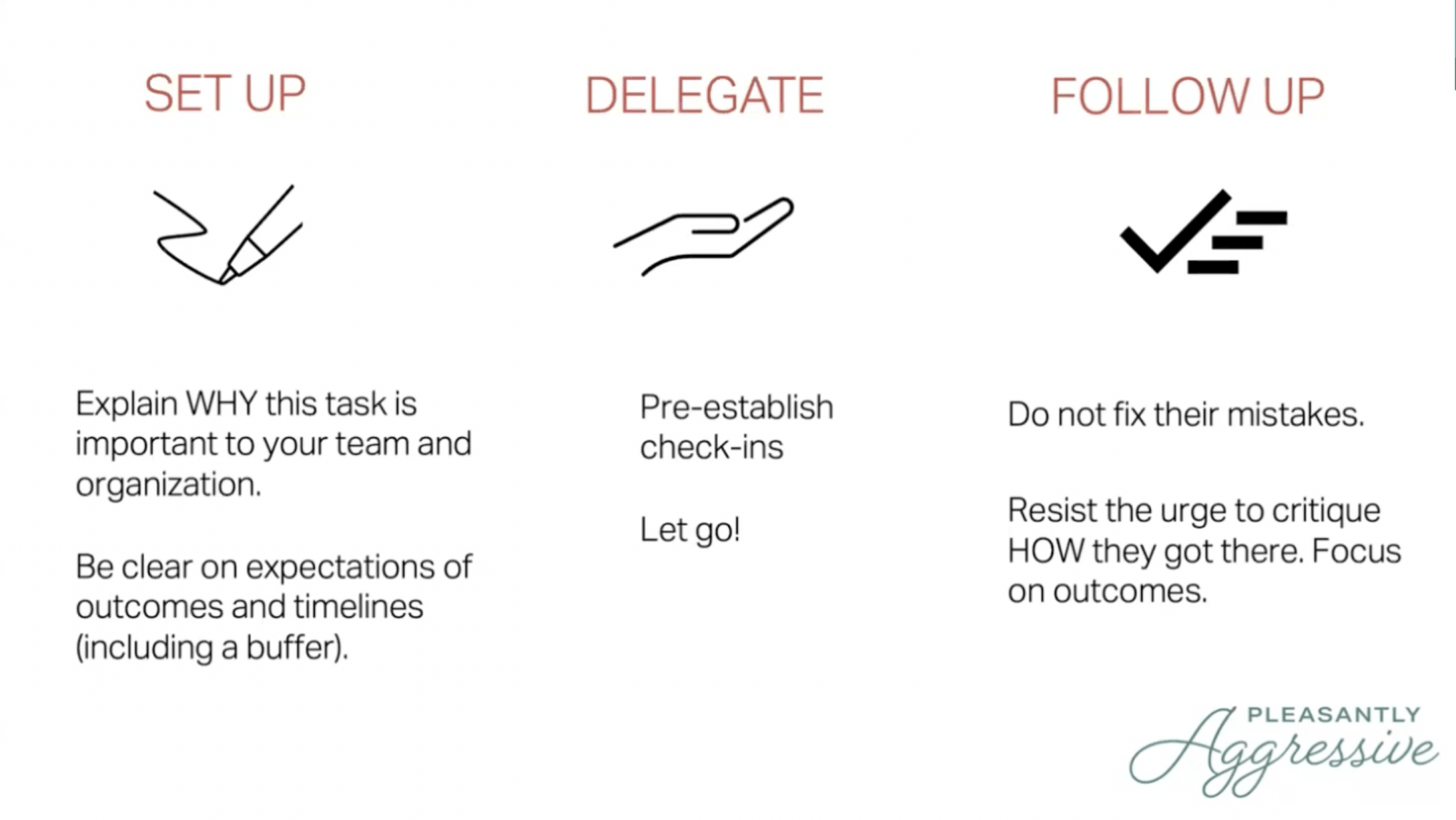Mastering the Art of Delegation
 "Delegation gets a bad rap," says Rebecca Malotke-Meslin, owner of Pleasantly Aggressive Coaching and Consulting. People tend to think of delegation as assigning low-level or "grunt work" tasks onto employees to save themselves the time or bother. Or maybe they've had a bad experience with a job they'd been delegated and failed, lacking the proper guidance and training to succeed.
"Delegation gets a bad rap," says Rebecca Malotke-Meslin, owner of Pleasantly Aggressive Coaching and Consulting. People tend to think of delegation as assigning low-level or "grunt work" tasks onto employees to save themselves the time or bother. Or maybe they've had a bad experience with a job they'd been delegated and failed, lacking the proper guidance and training to succeed.
But in her recent SPARC webinar "From Overwhelmed to Empowered: Mastering the Art of Delegation," Rebecca shows that creating a culture of delegation builds trust, empowers team members, and gives you back time to focus on the high-level goals your own position requires.

Establish Boundaries
Protect your time by learning to say "no" more. Give yourself space to think about requests before responding and ask yourself: does this particular task get me closer to my goals? If the answer isn't a clear yes, then you should probably say no.
Be transparent with your team about why delegation is important. Have conversations where you share your need to focus on strategic initiatives and goals and that you'll be delegating some of your tasks to them. Explaining why it's necessary helps them understand the value of what you're asking them to do.
Scrutinize Your To-Do list
Evaluate your list of tasks and ask these questions:
Can it be eliminated? What is the goal of this task? Is the time and energy it takes worth the outcome?
Can it be outsourced? Outsourcing can include part-time employees on the payroll looking for extra hours, outside help, or technology such as calendar and productivity apps. (Delegation includes technology and automaticity.)
Can it be delegated? Which tasks are necessary but do not help you directly achieve your goals? Who on your team can be trained to do it?
Can it be reassigned? Is this task necessary to you or your team? Can it be given to another department? You may need to speak with your CFO or other leader to help redistribute your team's workload.
Prioritize Tasks to Align With Your Goals
Focus on your goals--the job you were hired to do and on what you'll be evaluated by your boss. Your goals are your touchstone for deciding which tasks take priority.
Ask Your Team What it Needs to Thrive
Regardless of what you observe, don't assume your team is working at capacity or overwhelmed. Ask them what they need. Ask if they feel satisfied with their work, if there's something they want to learn, if there are other tasks they'd like to take on.
The Art of Delegation: Set Them Up for Success

Delegation is a process. The goal is to empower your team members to succeed. Follow these three steps to ensure the best outcome:
1. Set Up
Begin by explaining why the task matters. Most people miss this step, according to Rebecca. Knowing the why goes a long way toward your team member's buy-in to what you're asking. They feel that the work is valuable and matters, enhancing their motivation--especially if you can tie it to a bigger goal.
Be clear about what outcomes you expect and what the timeline is. Always add a buffer to the timeline to allow for reviewing the work, and expect mistakes--mistakes are how they learn and grow.
2. Delegate
Establish check-in times to ensure they're making progress. Let them work independently and avoid micromanaging--stick to your scheduled check-ins.
If you find that they've made no progress or they don't seem to be learning anything from the process, you may want to reclaim the task, saying you gave them too tight of a deadline. Let them know you'll revisit this later to talk about it but don't let them fail doing something they're not ready to do.
3. Follow Up
When reviewing their work, point out mistakes, but don't fix them yourself. This is why you add a time buffer--so you could point out errors, show them how to fix them if necessary, let them do the corrections and learn from them, and do an even better job next time.
If they accomplished the task differently then you would have, don't critique how they got there. Instead, be curious and ask why they did it that way. You may learn something--it may be a more efficient method than yours.
The long-term sustainability of our schools and programs requires long-term planning and strategizing. Delegation also requires a long-term mindset: it is a time investment, aligned with long-term sustainability, that results in greater efficiency, team empowerment, and growth leading toward our goals. It is a powerful and vital skill that should be a part of every leader's skill set.
Webinars like Rebecca's "Mastering the Art of Delegation" are FREE for all SPARC members. Join us today for more professional development resources and a wealth of auxiliary community support with SPARC Connect.
